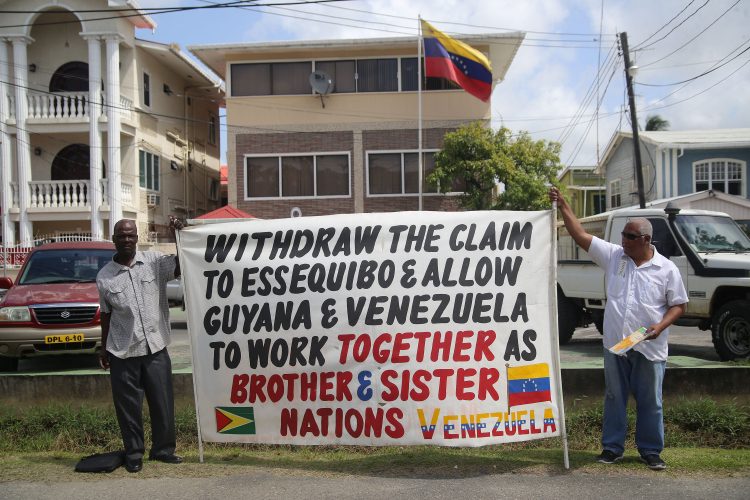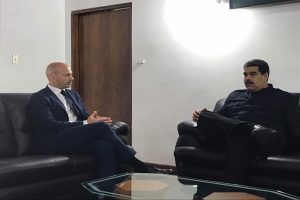
Withdraw claim: Activist Don Gomes (right) and his friend yesterday held a protest in front of the Venezuelan Embassy on Thomas Street calling for Venezuela to withdraw its claim to Guyana’s Essequibo.
Feb 2,2018.
Citing the Philippines’ case against China, Ambassador Cedric Joseph last evening stated that Guyana can unilaterally present to the World Court its case on the border controversy in the absence of Venezuelan participation.
According to Joseph, a precedent exists for such action and as long as jurisdiction is acknowledged, Guyana has “to make the first move to the court.” At the time he was speaking at the University of Guyana’s second conversation on Law and Society titled Guyana’s Borders: Boundaries, Barriers, or Bridges, held at the Theatre Guild last evening.
As part of a panel of four speakers, including Major General retired Joseph Singh, Ambassador Keith George and Paulette Henry, Joseph responded to a series of questions from the audience. One of the questions asked centred on what actions Guyana could take if Venezuela rejected a recommendation on Tuesday from Secretary General Antonio Guterres that the border controversy with Guyana be forwarded to the International Court of Justice (ICJ) also known as the World Court. Guyana has welcomed the referral of the controversy to the World Court, something it has been seeking over the last four years.
In a statement on Wednesday the Venezuelan government criticized the action of SG Guterres and his predecessor Ban Ki-moon. It was Ban who in a December 15, 2016 communique directed that the matter be sent to the ICJ if the Good Offices process for the controversy yielded no substantial results by the end of 2017. According to Venezuela the criteria contained in that communique exceeded the powers granted to its investiture, contravening the spirit, purpose and reason of the Geneva Agreement. They however did not reject the recommendation instead the Maduro government went back to its earlier position that the Geneva Agreement of February 17, 1966 contains the means through which a political settlement of the controversy can be found. Guyana doesn’t subscribe to this notion and has been pressing over the last four years for a juridical settlement of the controversy which has subsisted since 1962.
Joseph reiterated this position noting that this country does not “want another 51 years of Geneva.” “There are no other facilities in Geneva,” he stressed reminding that the facilities of the Geneva agreement originate from Article 33 (1)of UN charter.
This article notes that “the parties to any dispute, the continuance of which is likely to endanger the maintenance of international peace and security, shall, first of all, seek a solution by negotiation, enquiry, mediation, conciliation, arbitration, judicial settlement, resort to regional agencies or arrangements, or other peaceful means of their own choice.”
The Ambassador stressed that last means catered for is a judicial settlement.
“When you speak of a judicial settlement in the UN framework you are speaking of the body established within the UN framework to facilitate a judicial settlement, that is the ICJ,” he said.
He added that the ICJ remains the only hope for a final settlement one way or the other.
“You have an issue, you contend it’s [the 1899 arbitration] null and void that’s not a political issue that’s a legal issue. You have to advance legal arguments to support your case and there is only one body that can respond to that, the ICJ. Venezuela has deformed, rejected and abused all of the major articles of Geneva yet now they pretend to present the Geneva agreement as a means of settlement,” Joseph queried.
He further explained that while he could not speak to the issue of compliance with any decision since the international system is regime which functions on consent he can present the case of the South China Sea as an example of a case which was conducted without participation from both parties.
“The Philippines brought a case against China. They (China) did not participate but the court went ahead and issued a substantial judgement. I can’t speak to compliance but if Venezuela says they are not going to The Hague whatever case we put on the history of the Geneva agreement and the validity of the arbitral award will stand,” he noted.
In July 2016 a tribunal of five judges at Hague-based Permanent Court of Arbitration issued a unanimous award in Republic of Philippines v. People’s Republic of China. The case was filed in 2013 by Manila concerning maritime entitlements and the status of features in the South China Sea, among other issues.
The Tribunal’s award is highly favourable to the Philippines specifically ruling that China’s nine-dash line claim and accompanying claims to historic rights have no validity under international law as well as that the behaviour of Chinese ships physically obstructing Philippine vessels is unlawful. China has used the nine-dash line to substantiate their claim to a major part of the South China.
Beijing while choosing not to directly participate in the court case had issued a white paper outlining their position on the issue. They have since rejected the ruling.
A statement issued on Tuesday by the Spokesman for the UN Secretary-General noted that Guterres “has carefully analysed developments in 2017 in the good offices process and has concluded that significant progress has not been made toward arriving at a full agreement for the solution of the controversy Accordingly, the Secretary-General has fulfilled the responsibility that has fallen to him within the framework set by his predecessor in December 2016, and has chosen the International Court of Justice as the means to be used for the solution of the controversy.”
The UN statement explained that within the framework of the Geneva Agreement, a Good Offices Process under the Secretary-General has been in place since 1990 in order to find a solution to the controversy. This process has so far involved three Personal Representatives of the Secretary-General (PRSG) but has been able to bridge the differences between the parties.
It reminded that former Secretary-General Ban Ki-moon had communicated to the parties on 15 December 2016 a framework for the resolution of the border controversy based on his conclusions on what would constitute the most appropriate next steps. In this communication he stated that the Good Offices Process would continue for one final year, until the end of 2017, with a strengthened mandate of mediation.

